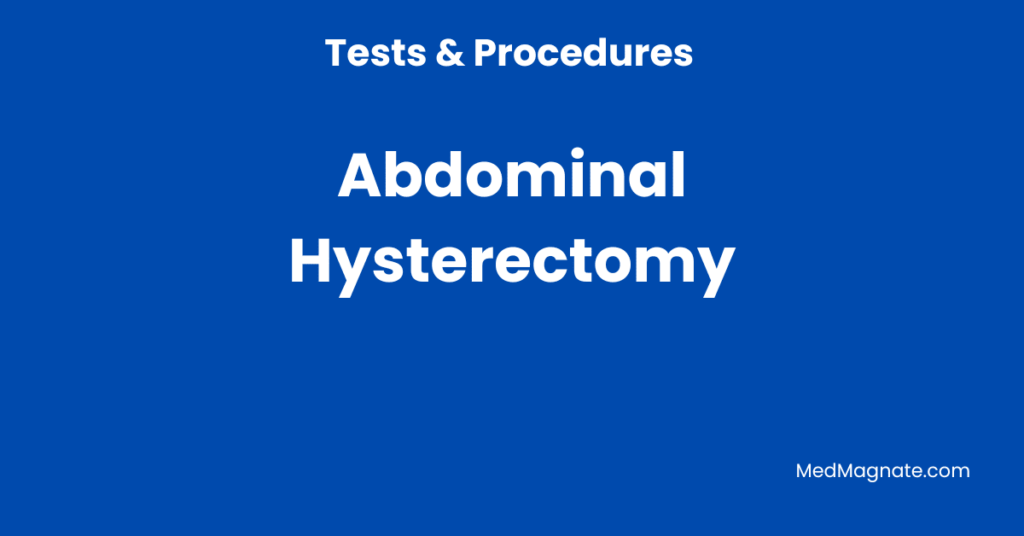An abdominal hysterectomy is a surgical procedure in which a doctor removes a woman’s uterus through an incision in the abdomen. It is a common surgery for women with certain medical conditions affecting the uterus.
Why is an Abdominal Hysterectomy Done?
An abdominal hysterectomy is performed for several reasons, including:
- Uterine Fibroids: Non-cancerous growths causing pain, heavy bleeding, or pressure.
- Endometriosis: Tissue growing outside the uterus causing pain and bleeding.
- Uterine Cancer: Cancer of the uterus, cervix, or surrounding tissues.
- Abnormal Uterine Bleeding: Heavy or irregular bleeding not controlled by medication.
- Pelvic Pain or Prolapse: Uterus or other organs dropping from normal position.
- Adenomyosis: Uterine lining grows into the muscle wall, causing pain and heavy periods.
Types of Hysterectomy
- Total Hysterectomy: Removal of the uterus and cervix.
- Partial (Subtotal) Hysterectomy: Only the upper part of the uterus is removed, leaving the cervix.
- Radical Hysterectomy: Removal of uterus, cervix, part of the vagina, and surrounding tissues, usually done in cancer cases.
Abdominal hysterectomy refers to performing any of these types through a large abdominal incision.
How is an Abdominal Hysterectomy Performed?
- Preparation: The patient is given general anesthesia.
- Incision: A horizontal (bikini line) or vertical incision is made in the lower abdomen.
- Surgery: The uterus is carefully removed. If needed, surrounding tissues or ovaries may also be removed.
- Closure: Incision is stitched up, and the area is cleaned.
The surgery usually takes 1–2 hours, depending on complexity.
Benefits of Abdominal Hysterectomy
- Provides a permanent solution for uterine problems.
- Reduces or eliminates pain, bleeding, and other symptoms caused by fibroids, endometriosis, or cancer.
- Allows doctors to examine the uterus and surrounding organs directly.
- Effective when less invasive methods fail.
Risks and Complications
While generally safe, abdominal hysterectomy is major surgery and has potential risks:
Short-Term Risks
- Infection at incision site
- Blood loss or anemia
- Blood clots in legs or lungs
- Injury to bladder, ureters, or bowel
- Reactions to anesthesia
Long-Term Risks
- Adhesions (scar tissue inside abdomen)
- Early menopause if ovaries are removed
- Changes in sexual function or libido
- Pelvic organ prolapse (rare)
Recovery After Abdominal Hysterectomy
- Hospital stay is usually 3–5 days.
- Full recovery can take 6–8 weeks.
- Tips for smooth recovery:
- Avoid heavy lifting or strenuous activity
- Take prescribed painkillers and antibiotics
- Keep incision clean and dry
- Eat a healthy, fiber-rich diet to prevent constipation
- Gradually start walking to improve blood circulation
Abdominal Hysterectomy vs Other Hysterectomy Methods
| Method | Incision | Recovery Time | Best For |
| Abdominal | Large incision in abdomen | 6–8 weeks | Large fibroids, cancer, complicated cases |
| Vaginal | Through the vagina, no external incision | 4–6 weeks | Small uterus, prolapse |
| Laparoscopic | Small keyhole incisions | 3–4 weeks | Less complex cases, faster recovery |
Conclusion
An abdominal hysterectomy is a surgical procedure to remove the uterus through an incision in the abdomen. It is performed for fibroids, cancer, endometriosis, or heavy bleeding. While highly effective, it is a major surgery with potential risks, so proper care, rest, and follow-up are essential for recovery.
FAQs
Q 1. What is an abdominal hysterectomy?
It is surgery to remove the uterus through an incision in the lower abdomen.
Q 2. How long does the surgery take?
Usually 1–2 hours, depending on the complexity.
Q 3. How long is the recovery period?
Full recovery typically takes 6–8 weeks. Hospital stay is 3–5 days.
Q 4. Can I have children after a hysterectomy?
No, pregnancy is not possible after the uterus is removed.
Q 5. Will menopause start after hysterectomy?
If ovaries are removed during surgery, menopause may begin immediately. If ovaries are left, normal menopause timing may continue.
Q 6. What are the risks of abdominal hysterectomy?
Infection, blood clots, injury to surrounding organs, and scar tissue are possible. Long-term risks include changes in sexual function and early menopause if ovaries are removed.
Q 7. Can I have a normal sex life after hysterectomy?
Yes, most women resume sexual activity after recovery, but some may notice changes in sensation or libido, depending on the surgery.

